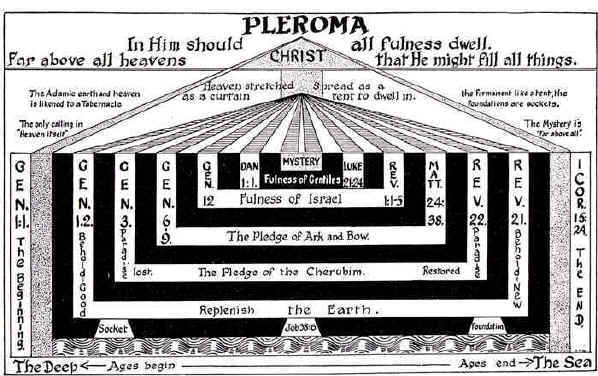
(10) THE TITLE HEAD AND ITS RELATION TO "THE FULNESS"
The highest title ascribed to Christ in any dispensation other than that of The Mystery is that of "a Priest forever after the order of Melchisedec." This priesthood is superior to that of Aaron; it functions at the Right Hand of God, its sphere is the True Tabernacle, which God pitched and not man, namely "Heaven Itself," and it combines the two offices of King and Priest. Just as water cannot rise above its own level so that no calling can rise above the position set by Christ, and the calling that recognizes Him as King-Priest is itself "a Kingdom of Priests," "a Holy Nation and a Royal Priesthood."
It is significant that throughout the Prison Epistles, Christ is never called either "King" or "Priest," even as it is equally true that The Church of that Calling is never called a kingdom or a priesthood but is called "The Body" of Christ. Argument from the absence of terms, like arguing from a negative, is in most cases suspect, but in this particular instance, it cannot be said that a "kingdom" is never mentioned in The Prison Epistles. We read in Ephesians 5:5 of "The Kingdom of Christ and of God," in Colossians 1:13 and Col. 4:11 "The Kingdom of His Dear Son" and "The Kingdom of God," and in 2 Timothy 4:1 and 2 Tim. 4:18, "His Appearing and His Kingdom," and "His Heavenly Kingdom". In The Epistles of Paul, other than the four great Prison Epistles, a "Kingdom" is mentioned nine times, but the only passage where Christ can be said to have the title King is in 1 Timothy 6:15, where the exhibition of the title is spoken of as a future event "which in His times He shall show, Who is the blessed and only Potentate the King of kings, and Lord of lords."
The Epistles to the Ephesians and the Colossians contain terms that seem to demand the work of a priest, such as "acceptance," "access," "made nigh," and "offer," yet there is not a single reference outside of Hebrews to Christ as a priest. In Epistles before and after Acts 28, Christ is represented as "Seated at the Right Hand of God," yet never, outside of Hebrews, is the office of priest mentioned. If a "dominion" and a "coronation" are indications of the presence of a king, then Adam was a king. The "dominion" given to him is the translation of the Hebrew radah, a word translated elsewhere as "reign" and "rule" and used of Christ "the King's Son" in Psalm 72:8. The word translated "crowned" in Psalm 8:5 is the Hebrew atar, which is the verb form of atarah "the king's crown" (2 Sam. 12:30). Adam, however, is never once spoken of as a king. He was a figure of Him that was to come and can be spoken of with propriety as Head of the human race, and as such, he embraced all that kingship can mean, but much more.
Noah not only had dominion in his degree (Gen. 9:2), but he offered sacrifices with acceptance (Gen. 8:20-21). The word "sweet," which is used for the savor of the sacrifice offered, is employed throughout the O.T. to indicate the "savor" or "odor" of sacrifice. We should, therefore, not be surprised to find that Noah was a "priest." Yet he is never so-called. He can be, however, designated as Adam was before him, Head of the race of which those delivered from the flood were the progenitors.
Abraham was the father of "kings" (Gen. 17:6), and even of The King, The Lord Himself, Who was according to the flesh both son of Abraham and son of David, yet Abraham himself is never called a king. Abraham not only built an altar at the beginning of his pilgrimage upon which the only sacrifices permitted would have been those taken from the herd and the flock, but he came nearer to the heart of all true sacrifice when he was called upon to offer his only begotten son Isaac, yet Abraham is never called a priest. Like Adam and Noah, Abraham is more than king, more than priest; he is the father of Israel, to which he stands without contradiction as Head.
Even when we leave the chosen people and turn our attention to the first great king whose reign commenced the times of the Gentiles - Nebuchadnezzar, he too is spoken of by Daniel as "This Head of gold" (Dan. 2:38). Each one of the great outstanding figures that have foreshadowed the pleroma, or fulness, were "Heads" and in this they foreshadowed all that the office of King, Priest and Prophet alone could set forth. Even though Christ is never called either Prophet, Priest, or King in The Epistles of The Mystery, The Church of The One Body loses nothing if Christ is its Head; He is more than King and Priest and Prophet to The Church, for headship covers all.
With this preparation, let us turn to The Epistles of the Fulness, which are The Prison Epistles of Paul, and observe the way in which this special title "Head" is employed. The Greek word kephale is used for Christ in The Prison Epistles seven times, and the verb anakephalaioomai once. Let us look at the usage of this verb, which means "to head up." It occurs in Ephesians 1:10, where it is translated as "to gather together in one" in the A.V., "to sum up" in the R.V., and in Weymouth's translation, "of restoring the whole creation to find its one Head in Christ," and by J. N. Darby "to head up all things in Christ." It is in connection with the "pleroma" of the seasons that this figure of "heading up" is used, no other term being so appropriate or so complete. When the "fulness" arrives, Christ will be infinitely more than King or Priest; He will be "Head." The references to Christ as "Head" in The Prison Epistles are limited to the Epistles to the Ephesians and to the Colossians (Eph. 1:22; Eph. 4:15; Eph. 5:23; Col. 1:18; Col. 2:10; Col. 2:19).
These six references to kephale expand the promise of Ephesians 1:10, The Church of the present Dispensation being the most complete foreshadowing of The Goal of the ages that The Scriptures contain. To turn back to the types and shadows employed in earlier Scriptures is to turn by comparison from substance to shadow, although the "substance" here, in its turn, must necessarily be a "shadow" of the reality yet to come. The first passage brings us back from The Day when All Things in Heaven and Earth shall be Headed up in Christ to the present period when, in a day of rejection, confusion, and darkness, an elect company finds that Christ is to them what He will be Universally in the future.
Kephale - "Head" in Ephesians and Colossians
A. Eph. 1:22 Head over all things to the Church, which is His Body.
In this context, Christ is seen raised and seated "Far
above all principality and power". The word pleroma
being used as a title of The Church
B. a Eph. 4:15 Grow up.. . which is the Head, even Christ.
In this context, shows The Body
"fitly joined"together, every "joint"
working toward the "increase" of The Body.
The word pleroma is used in verse 13
as the goal of The Church "the measure of
the stature of the fulness of Christ"
b Eph. 5:23 Christ is The Head of The Church
A. Col. 1:18 He is The Head of The Body The Church
In the context of principalities and powers
are seen to be His Creation, and the
word pleroma is used in verse 19
"It pleased the Father that in Him should
all fulness dwell."
B. b Col. 2:10 Christ is The Head of all principality and power.
The word pleroma is found in Col. 2:9
a Col. 2:19 Holding The Head, from which all The Body
by "joints and bands" being "knit together"
"increaseth with the increase of God."
"And gave Him to be Head over all things to THE CHURCH" (Eph. 1:22). Christ is not yet recognized as "Head over all things," but soon will come The Day when "every knee shall bow, and every tongue shall confess" but what will be True then, in its widest sense, is True Now for "The Church which is His Body." In the glorious future, "God" will be All in all (1 Cor. 15:28), but That Day has not yet come. In The Church, which is His Body, "Christ is All and in all" (Col. 3:11). In the coming days, "...all things are put under His feet" (1 Cor. 15:27), but as in Hebrews, we say today, "...we see not yet all things put under Him" (Heb. 2:8); we can see His Ascension "Far above all principality and power, and might, and dominion, and every name that is named, not only in this world but also in that which is to come" and the fact that He is already Head over all things to The Church, is the most Glorious anticipation of this Universal Subjection of all to Him, and we learn the big picture from Ephesians 1:22 that indicates we join together the two major themes:
- "And hath put all things under His feet."
- "And gave Him to be Head over all things to the Church."
This Church, then, is in a unique position to understand and anticipate, as no other calling and company has or can, The Goal of The Ages. It is meet, therefore, that this should be set forth, and the Apostle follows the passage already quoted by revealing that This Church, which is His Body, is something more; it is "The Fulness" of Him, Who is The One that "Filleth All in all" (Eph. 1:23). All the fulness of the Godhead dwells in Him "Bodily," The Church which is His "Body" and in whom He dwells (Eph. 2:22; Eph. 3:17) is His Fulness. What Christ is to The Invisible God, The Church is to Christ. What Christ is to the whole Purpose of The Ages, The Church of The One Body is in the Heavenly Realm.
Ephesians 1:10 is here illustrated, foreshadowed, and anticipated, and this of itself is a glorious position to occupy, quite apart from all the other wonders of grace and glory that are associated with this high calling. Rotherham translates Ephesians 1:23:
"Which indeed is His Body. The fulness of Him Who the all things in all is for Himself filling up".
Moffatt reads:
"Filled by Him Who fills the universe entirely."
Possibly, the rendering given by Cunnington is nearest to The Truth:
"The fulness of Him Who all in all is receiving His fulness,"
to which he appends a footnote, "Philippians 2:7, the process of canceling the Emptying". "Canceling the Emptying." What a thought! A.T., writing in The Differentiator of August 1955, comments:
"Here we have a most beautiful thought. When Christ Jesus (note the term) emptied Himself, He must have emptied Himself of His fulness. But after His Resurrection, He got back His fulness-"...in Him delights the entire fulness to dwell" (Col. 1:19) -"...in Him is dwelling the entire fulness of the Deity bodily" (Col. 2:9).
Dr. Robinson gives a new thought from Colossians 2:9:
"For in Him dwelleth all the fulness of the Deity in a bodily way, and ye are filled (or fulfilled) in Him."
This is usually taken to refer to The Godhead residing in The Lord's Body in all its completeness. But Dr. Robinson says this would be to neglect Paul's special use of the terms "fulness" and "body" in his Epistles. The empty deceit of the philosophical despoiler can only give tradition and world elements in place of The Heavenly Christ. . . . Thus St. Paul looks forward to the ultimate issue of the Divine Purpose for the universe . . . this is found in Christ 'by way of a Body'; that is to say; in Christ as a whole in which The Head and The Body are inseparably one".
The Saviour had a Glory "before the world was" (John 17:5); He emptied Himself (Phil. 2:7) and has been subsequently Highly Exalted—that Glory He can and will share with the redeemed.
"And the glory which Thou gavest Me I have given them, that they may be one, even as We are one" (John 17:22).
The fulness of Him that filleth all in all is the most blessed anticipation of the day when God shall be All in all (1 Cor. 15:28).
We have seen that the title "Head" gathers up into itself all that the separate titles "King," "Priest," and "Prophet" imply, with ever so much more than any of these titles taken separately or all together can ever teach or contain. That Church of which Christ is "Head" not only lacks nothing but is infinitely more blessed in a closer relationship with Christ, as it anticipates The Goal of The Ages in a way no other company could ever do. We have seen that Ephesians 1:10 finds its expansion and anticipation in Ephesians 1:22-23, and we now pass on to the other references to Christ as The Head as they occur in The Epistles of The Mystery. The next reference to Christ as "Head" occurs in the practical section of Ephesians:
"But speaking the truth in love, may grow up into Him in all things, which is the head, even Christ" (Eph. 4:15).
Practice grows out of doctrine, and doctrine deals with calling, sphere of blessing, and standing in grace. What is stated as a fact before God in the revelation of the doctrine of Ephesians awaits experimental realization in the practical section. Let us see this in the large before concentrating our attention on the detail.
As a consequence of The Saviour's exaltation, "Far above all," in Ephesians 1:20-22, He is seen as Head over All Things to The Church, which Church is called "the fulness of Him that filleth all in all." In Ephesians 4, we find that the Ascension "Far above all" is restated, and the "fulness" is indicated as a goal.
"He that descended is the same also that ascended up Far Above All heavens, that He might Fill All Things" (Eph. 4:10).
The gift of Apostles, etc., from this Ascended One, has as its goal "the perfect man," and its measure the stature of "the fulness" of Christ (Eph. 4:13). It is evident from this language of Ephesians 4:8-13, that we are here presented with the outworking of The Truth set out in Chapter 1.
Coming now to Ephesians 4:15, we observe that the words of the A.V., "speaking the truth in love," are somewhat free, there being no equivalent in Greek for the word "speaking." The A.V. margin puts as an alternative "being sincere," and the R.V. margin reads "dealing truly." The Greek word under consideration is aletheuein, of which Alford, in his commentary, says "it is almost impossible to express it satisfactorily in English," and suggests the translation "being followers of Truth" but says of this "the objection to "followers of truth" is that it may be mistaken for "searchers after truth," but I can find no expression which does not lie open to equal objection." The only other occurrence of aletheuein is Galatians 4:16, where the A.V. renders it "because I tell (you) the truth."
It is not possible in English to say "truthing in love"; we must say "being sincere," "being true or truthful," or "speaking The Truth." None of these expressions, however, exactly present to the mind what the verb aletheuein does. The LXX of Genesis 42:16 employs this word where we read, "ye shall be kept in prison, that your words may be proved, whether there be any truth in you; or else by the life of Pharaoh surely ye are spies."
In Isaiah 44:26, the LXX employs aletheuein to translate the word shalam, "perform," but when the same Hebrew word occurs again in Isa. 44:28, it is there translated by the Greek poiein "to make or to do." If we can imagine a word in English that conjures up to the mind a person whose whole life is Truth, whose very breath and atmosphere is Truth, whose desires, will, plans, and activities are Truth, we may perhaps approach the meaning of Ephesians 4:15. This utter regard for "Truth," however, is balanced, for it must be held "in Love"; without that, such zeal in present circumstances would lead to fanaticism and a persecuting spirit.
This utter regard for Truth held in Love is the great accessory to "growth," "may grow up into Him in all things." Growing up into Christ in all things is the practical echo of the basic doctrinal fact that has already been revealed concerning the constitution of The Church of The One Body in Ephesians 1:22-23. Not only so, but it is the practical and experimental echo of The Truth revealed in Ephesians 2:21.
"In Whom all the building Fitly Framed Together (sunarmologomai) Groweth (auxano) unto an Holy Temple in The Lord."
The word sunarmologomai is repeated in Ephesians 4:16, where it is translated as "Fitly Joined Together," and the words auxano and auxesis are found in Ephesians 4:15-16, "may Grow (auxano) Up unto Him"; "maketh Increase (auxesis) of the Body."
Not only do these words recur, but just as The Church of The One Body is the fulness of Him that filleth All (ta panta "all these") in all, so this growth of Ephesians 4:15 is unto Him in All (these) Things (ta panta). Most translators supply the preposition "in" before "all things" in order to make it easy reading, and this reading may give the intention of the Apostle, namely, that The Church should grow up into Christ in every particular, in all ways, in all things. Nevertheless, the mind returns to the fact that what the Apostle actually wrote was auxesomen eis auton ta panta, which rendered literally reads, "...we may grow into Him the all things". This rendering, while it does not "read" and is not good English, leaves in the mind a different conception from that of the A.V. Can it be the Apostle intends us to understand him to mean that by holding The Truth inviolate in Love, we shall be encouraging that growth into Him, which the N.T. speaks of as ta panta, some specific, blessed totality of Glory, in which Christ is now the summary ta panta Himself, "the all things" in all? (Col. 3:11), anticipating The Goal of God, when God Himself shall be ta panta en pasin, "the all things in all"? Before, however, such words can have their true effect, it becomes necessary that we pause here in order to place before the reader the peculiar usage of the phrase ta panta, for the phrase "the all things" sounds strange to our ears.
Pas is an adjective, translated either "all or "every" in the majority of cases. The plural panta, "all things," is used with or without the article, and these two forms must be distinguished. We cannot very well translate ta panta "the all things" for that has an un-English sound, but a survey of the usage of these two forms panta and ta panta, may enable us to reach some agreed rendering that will satisfy every claim, and present a fair translation of the inspired original. The two forms are found in Romans 8, and their fitness is easily recognized by reason of the context of each form.
There is a good deal of suffering in Romans 8, induced both by the failure and frailty of the believer himself and coming upon him by reason of his fellowship with Christ, his place in a groaning creation, and the attack of enemies. In consequence, he is sometimes at a loss to know "what to pray for" as he ought, but he does know, in the midst of all life's uncertainty, that "all things work together for good to them that love God" (Rom. 8:28). Here "all things" is panta without the article "the" ta, all things whether good or evil. Later in the Chapter, the Apostle says:
"He that spared not His own Son, but delivered Him up for us all, how shall He not with Him also freely give us all things?" (Rom. 8:32).
Here, "all things" is ta panta, some specific "all things," namely those things which come under the heading of Redemption and which constitute The Goal and consummation of The Ages. The word Panta without the article is unlimited; panta with the article is restricted to the realm of Redeeming Grace. "All these" is the translation of ta panta in Colossians 3:8, which is a good example of its restricted meaning.
Romans 11 does not teach that "all things" without limit or restriction owe their origin, persistence, and final blessing to The Lord:
"For of Him, and through Him, and to Him are ta panta" (Rom. 11:36), namely that conception of the Universe that embraces all in Heaven and in Earth that come under the Grace and Power of The Redeemer. The advocates of universal reconciliation, while recognizing the presence of the article in Romans 11:32, use this verse to support their doctrine and omit the articles in their translation. It is not the teaching here that "God hath concluded All in unbelief that He might have mercy upon All," but the whole verse should be rendered;
"For God had concluded Them All in unbelief, that He might have mercy on Them All" (Rom. 11:32).
Where universality is intended in Romans 9:5, the article is omitted: God is over All, without limitation or reserve. In the verses that follow, Paul uses All without the article with this same discrimination, "for they are not all Israel (pantes without the article) which are of Israel"; the "seed" were called "in Isaac" (Rom. 9:6-7). We must, therefore, read the words, "and so all Israel shall be saved" (Rom. 11:26) in the light of Romans 9:6-7. The All" that are to be saved are those who were "in Isaac," a type and shadow of the greater company of the saved at the end. In case the reader should expect to find the article here, we point out that the word "All" does not here stand alone and without qualification, pas Israel "all Israel" is already limited and does not need the article "the."
Let us note the use of panta and ta panta in Ephesians, and by this, we do not intend every single occurrence, for such phrases as "all spiritual blessings" do not come within the scope of this inquiry.
That which is to be "gathered together in one" is ta panta (Eph. 1:10), not panta without the article. That which is "put in subjection under His feet" is panta all things including enemies (Eph. 1:22). He is also Head over all things, panta, good as well as evil, to The Church which is His Body (Eph.1:22), and He is The One who fills ta panta, that special company, without limit or reserve. The second reference to "all" is without the article, and en pasin has been rendered "everywhere," "in every way," and "in every case". The creation of "all things" ta panta of Ephesians 3:9 is limited because it is directly associated with The Mystery that had been hidden in God.
Where the words "One God and Father of ALL, Who is above ALL, and through ALL and in (you) ALL" (Eph. 4:6) occur, the word used is panton and pasin without the article. The subject is already limited to "the Unity of the Spirit," and the insertion of humin "you" in the text followed by the A.V. shows that this sense was clearly understood. J. N. Darby adopts the reading hemin "in us all," which has been rendered by some "and in all To You," making the passage balance Ephesians 1:22, where Christ is not revealed as Head over all in the fullest sense yet, but as Head over all To THE CHURCH.
One passage in Colossians must be included. Paul speaks of the new creation "where there is neither Greek nor Jew . . . but (ta panta kai en pasin Christos) the all things and in all Christ" (Col. 3:11). Here, "Christ" is put in apposition to "the all things," He Himself sums up in Himself the entire new creation. Of this, He is The Head, and it is in His Image that all will be renewed; all other categories of worth and privilege are lost and put aside.
So also in Ephesians 4:15 ta panta "the all things" is in apposition with the "Head, even Christ." The "Fulness" that embraces this "all things" is Christ and His Church, not Christ Alone, and certainly not The Church alone. Of both Christ and His Church is "Fulness" predicated, but only as Head and Body making One Blessed Company. True growth presses to "the measure of the stature of the fulness of Christ," and in this Dispensation, the growth of The One Body up into Him, Who is The Head is the great example and exhibition of what The Day of Glory will reveal in its perfection.
Christ as "Head" is our theme, and here we see the first unfolding, which is in germ in Ephesians 1:22-23.
As we prosecute our studies, we shall learn that other phases of this growth and perfecting are associated with Christ The Head until, we hope, when the survey is completed, every reader will concur with our proposition, set out earlier in this exposition, that whatever blessings are to be associated with the great title of King, Priest, and Prophet, they are all absorbed, filled and taken to their true end, in the one great title given to Christ in the Epistles of The Mystery, "The Head."
(11) "THE FULNESS OF THE SEASONS"
The failure of Israel at the time of Nebuchadnezzar was answered by the times of the Gentiles, which commenced in the third year of Jehoiakim, King of Judah (Dan.1:1), but, although earthly dominion passed from Israel at that time, they did not become lo-ammi in the full sense of the term until a fuller and deeper apostasy opened a deeper gulf, that could only be spanned by a greater and more spiritual fulness among the Gentiles. In the fulness of time, God sent forth His Son, and His birth at Bethlehem and His genealogy constitute the Opening Chapter of the Book of the New Covenant (Matt. 1). The earthly ministry of the Saviour opened with a proclamation concerning The Kingdom of Heaven (Matt. 4:17), and as "The King of the Jews" He was crucified (Matt. 27:37). The earlier stages of the culmination of rejection is revealed in chapters eleven to thirteen:
Matt. 11:20, Matt. 11:26 "They repented not." "Even so, Father".
Matt. 12:6, Matt. 12:41, Matt. 12:42 "A greater than the temple, than Jonah and than Solomon" rejected (Priest, Prophet and King).
Matt. Chapter 13 The MYSTERY of The Kingdom of Heaven.
In these three chapters, the gap and its antidote is anticipated. The miracles that The Saviour wrought had as their primary purpose the repentance of Israel, and so to lead to the setting up of The Kingdom (Matt. 11:20-24). Christ stood in their midst as Prophet, Priest, and King, but they knew Him not.
In Matthew 12, we meet the first favorable use of the word "Gentile." In Matthew 10:5, the disciples were told, "...go not into the way of the Gentiles," but upon it becoming manifest in Matthew 11 that Israel was not going to repent, a change is indicated.
"That it might be fulfilled which was spoken by Esaias the prophet, saying . . . He shall shew judgment to the Gentiles . . . And in His name shall the Gentiles trust" (Matt. 12:17-21).
The next chapter, Matthew 13, supplies the third keyword, namely "Mystery." Summing up these momentous chapters, we have:
1. No repentance of Israel, despite evidence of miracles.
2. The inclusion of the Gentiles for the first time, consequent upon Israel's failure.
3. The Kingdom of Heaven passes into its "Mystery" stage, and the parable form of speech is introduced.
The introduction of the Parable, contrary to popular interpretation, was NOT in order that the common people should be enabled to understand the message of The Gospel but to veil the new aspect of Truth from the eyes of those who were non-repentant. As this point of view is so contrary to that which is considered "orthodox," let us consider what The Lord actually said in answer to His disciples' question, "Why speakest Thou unto them in parables?" (Matt. 13:10). The very fact that the disciples were moved to ask such a question suggests that the parable form of speech was new to The Saviour's method hitherto. His answer is unambiguous and conclusive.
"He answered and said unto them, Because it is given unto you to know The Mysteries of the kingdom of heaven, but to them, it is not given" (Matt. 13:11).
The second part of the Lord's answer indicates that a great dispensational change was imminent.
"Therefore speak I to them in parables: because they seeing see not; and hearing they hear not, neither do they understand. And in them is fulfilled the prophecy of Esaias . . . but blessed are your eyes, for they see, and your ears, for they hear" (Matt. 13:13-16).
The people of Israel had reached the point when the blindness prophesied by Isaiah had begun to take effect. It is important to note the peculiar word used by The Lord here, which is translated as "fulfilled." Up to Matthew 13:14, the accepted formula "that it might be fulfilled" or "then was fulfilled" translates the verb pleroo, and this on seven occasions (Matt. 1:22; Matt. 2:15; Matt. 2:17; Matt. 2:23; Matt. 4:14; Matt. 8:17 and Matt. 12:17). Once only in the whole record of The Saviour's utterances, is there a departure from this rule, and that is made at Matthew 13:14, where the intensive form anapleroo is employed. There is an element of completion about this word, as 1 Thessalonians 2:16 will show.
Even though the long-suffering of God waited throughout the whole period covered by the Acts of the Apostles, and there was granted a stay of execution consequent upon The Saviour's prayer and the witness of Pentecost, it is not without significance, when the Apostle in his turn quotes Isaiah 6:9-10 in a similar context, namely, upon the rejection of Israel, the favorable mention of the Gentile, and the bringing in of The Dispensation of The Mystery, he does not say, "in them is fulfilled" but instead says, "well spake the Holy Ghost by Esaias the prophet unto our fathers" (Acts 28:25). What was law in Matthew 12 is fact in Acts 28:25-28.
At the failure of Israel, the Apostle Paul became the Prisoner of The Lord and, as such, received The Dispensation of The Grace of God for the Gentiles, The Dispensation of The Mystery (Eph. 3:1-9 R.V.), and while The Church of this new Dispensation is usually referred to by its title, "The Church which is His Body" or "The One Body," there is an extension of this title that is of vast importance. The full passage reads:
"And hath put all things under His feet, and gave Him to be Head over all things to The Church which is His Body, The Fulness of Him that Filleth All in all" (Eph. 1:22-23).
When The Dispensation of The Mystery comes to an end, the successive dispensations that have suffered a rupture will be resumed, and the signs of the times thicken around us, that tell us plainly that the lo-ammi ("not My people") condition is nearing its close. Already believing Jews who accept Jesus as their Messiah are gathering and witnessing in complete independence of Gentile Christianity and the claim of Israel for national recognition, made at Pentecost 1948, while not to be confused with The Day when they shall be restored by The Lord Himself (Ezek. 34:11-16), is certainly an indication that the great epoch is upon us. The Church of The Mystery fills the last gap in the outworking of the ages, and in this Dispensation of The Mystery, the conception of "Fulness" receives its fullest exposition. The following are the references in The Prison Epistles that must be given attention before our study of this subject can be considered at all complete.
Pleroma in the Prison Epistles
"The dispensation of the fulness of times" (Eph. 1:10).
"The fulness of Him that filleth all in all" (Eph. 1:23).
"That ye may be filled unto all the fulness of God" (Eph. 3:19).
"The measure of the stature of the fulness of Christ" (Eph. 4:13).
"It pleased the Father that in Him should all fulness dwell" (Col. 1:19).
"For in Him dwelleth all the fulness of the Godhead bodily" (Col. 2:9).
These references fall into two groups:
The one reference that speaks of the fulness of times.
The five references that speak of the Church and the Lord.
In this study, we will deal with the first reference, Ephesians 1:10.
"That in the dispensation of the fulness of times He might gather together in one all things in Christ both which are in heaven, and which are on earth; even in Him."
It is evident that the passages flow out of something stated earlier. In Eph. 1:9, we read of "the mystery of His will," which He hath purposed in Himself, which leads to the opening word of Eph. 1:10, eis "unto." This preposition eis variously translated as "into," "unto," "in," "to," "for," "towards," "until," "throughout," "concerning," "that," "with," and "on" in this one Epistle to the Ephesians, has one underlying meaning however varied the translation; it indicates a goal "unto" which something tends. We could freely translate eis here in Ephesians 1:10 by the words "with a view to". The Secret of His will and its Revelation at this time is with a view to a Dispensation.
What is in view is "a dispensation of the fulness of times." When the Son of God came into the world, it was "when the fulness of the Time was come" (Gal. 4:4); here in Ephesians, we look forward to a Dispensation of the fulness of Times. What is the difference between these two expressions, "time" and "times"?
"Time" is from the same root as "tide," and Aristotle observes, "Our conception of time originates in that of motion." Time is the measure of movement. To say that a motor car was traveling at sixty miles says nothing; the complete statement must be "sixty miles per hour" or day, as the case may be. "Season," on the other hand, derives from the Latin sationem, "a sowing," and looks not so much at the time but at the fitness and suitableness of the period under review.
"How many things by season season'd are" (Shakespeare).
We, therefore, should revise Ephesians 1:10 and read:
"A dispensation of the fulness of the seasons."
Gap after gap has been succeeded by fulness after fulness, as we have already seen in the outworking of the age purpose, and at last, we have arrived at the fulness of these seasons; the many sowings are past, and the harvest is in view. The outstanding characteristic of The Dispensation of The Fulness of the Seasons is that therein,
"He might gather together in one all things in Christ, both which are in heaven and which are on earth; even in Him."
Where universality is intended, "things under the earth" are added, as in Philippians 2:10. Here the all things headed up in Christ are limited to the redeemed.
Strictly speaking, there is no Greek word for "gather together" and no Greek word for "in" or "one"; this is a free rendering of the one-word anakephalaioomai. Had the Apostle meant to say "gather together," he had the word sunago ready in his hand.
The Greek word kephale means the "Head" and this is both in the literal sense (Matt. 14:11) and in the spiritual (Eph. 4:15): Kephalaion means the "sum" either a sum of money (Acts 22:28), or a summary or summing up (Heb. 8:1). It must be remembered that the ancients placed the sum of a column of figures at the head, and not at the foot as we do now. Kephalis (Heb. 10:7) may refer to the brief "contents" that were written on the outside of a scroll rather than the complete "volume." The word used by Paul in Ephesians 1:10, therefore, means something more than "to gather together in one"; it means "to head up" or "to sum up" in Himself all that compose "the all things" before the Great Day of Glory dawns. In Ephesians 1:22-23 this Glorious "summing up" is foreshadowed and anticipated in the present position of Christ and His relation with The Church of the present Calling.
"And hath put all things under His feet (this is quoted again in 1 Cor. 15:27 and Heb. 2:8 with age-purpose associations), and gave Him to be Head (kephale) over all things (panta, all things without exception, whereas in Eph. 1:10 ta panta refers to the redeemed) to The Church which is His Body, the Fulness of Him, that filleth All in all (ta panta, not the wider term).
(12) "ALL THE FULNESS OF GOD"
The Church of The One Body is the great outstanding anticipation of The Goal of The Ages. It is associated with Him, under Whose feet are all things, it is associated with a Dispensation of The Fulness of the Seasons, when All Things are to be summed up in Him, and it is itself called:
"The fulness of Him that filleth all in all" (Eph. 1:23).
How are we to understand this statement? It aligns with the last occurrence of pleroma in Colossians, and as for that, the last, in the N.T.
"For in Him dwelleth all the fulness of the Godhead bodily" (Col. 2:9).
The first occurrence of pleroma in Ephesians stands by itself (Eph. 1:10); the remainder form a group that expands the theme, thus:
A. "The Church which is His Body, the fulness of Him that filleth all in all" (Eph. 1:22-23). Head. Body. Filleth all
B. "The whole family in heaven and earth . . . that Christ may dwell in your hearts by faith . . . filled unto all the fulness of God" (Eph. 3:14-19).
Whole family. Heaven and Earth. Dwell
C. "He ascended up far above all heavens, that He might fill all things. . . Unto a perfect man, unto the measure of the stature of the fulness of the Christ" (Eph. 4:8-13). Fill all things
B. "For in Him were all things created . . . all things were created by Him and for Him . . . He is the Head of the body the church . . . for it pleased the Father that in Him should all fulness dwell. . . to reconcile all things . . . in earth or things in heaven" (Col. 1:16-20). All things. Dwell. Heaven and Earth
A. "For in Him dwelleth all the fulness of the Godhead bodily, and ye . are filled to the full in Him, Which is the Head of all principality and power" (Col. 2:9-10). Head. Principality. Filled.
Here is a complete conspectus of this mighty theme, point answering point with such precision that no approach to one corresponding member can be undertaken without considering the other. This, the reader will perceive, each member is fraught with immediate consequences. It forces a comparison between Ephesians 1:22-23 and Colossians 2:9-10.
The passage in Colossians 2:9 has been taken as one of the proof texts of The Deity of Christ. The doctrine of The Deity of Christ constitutes a central belief here at Believer.com, yet we believe it to be a mistake to use Colossians 2:9 as proof of that wondrous doctrine. The Church of The One Body is "the fulness of Him that Filleth All in all," but such a revelation does not justify the thought that The Church is "Divine." The prayer of Ephesians 3 is that the believer may be "Filled with all the fulness of God," and if to be filled with all the fulness of The Godhead, Bodily teaches the Deity of Christ in Colossians 2:9, what does Ephesians 3:19 teach of the believer? Identical language, pan to pleroma, "all the fulness," is found in Ephesians 3:19, Colossians 1:19, and Col. 2:9, and these passages cannot be separated and interpreted independently of each other.
The "fulness" of Christ dwells "bodily" in The Church, even as the "fulness" of the Godhead dwells "bodily" in Him. There are, moreover, many contextual links that bind these references together as one whole. In Ephesians 1:21-23, the stress is upon the Headship of Christ as The Risen and Ascended One, with all things under His feet, The Church which is His Body, being the fulness of Him, Who in turn filleth all in all. In Colossians 1:15-20 the two creations are brought together, with Christ as "Firstborn" in each (Col. 1:15; Col. 1:18), with Christ as preeminent in each (Col. 1:17-18). Things in Heaven and Earth were His Creation (Col. 1:16), and they are to be the objects of Reconciliation (Col. 1:20).
When we come to Colossians 2:4-23, we have left the positive Revelation of Truth and entered the sphere of conflict with error. For our present purpose, we will give the opening and closing members of the structure found there:
A. a Col. 2:4-8 Plausible speech. Philosophy (sophos)
b Col. 2:8 Traditions of men
c Col. 2:8 Rudiments of the world
CORRECTIVE. Col. 2:8 Not after Christ. Fulness pleroma
Col. 2: 9 - 10 Ye are filled full in Him pleroo
* * * * * * * * * * * * *
A. c Col. 2:20-22 Rudiments of the world
b Col. 2:22 Teaching of men
a Col. 2:23 Wordy show of wisdom (sophos)
CORRECTIVE. Col. 2:23 Not in any honor.
Col. 2:23 Filling of the flesh plesmone.
Whatever is intended by Colossians 2:9, "all the fulness of the Godhead bodily," is closely and intentionally carried forward into Col. 2:10, for the word translated "complete" is pepleromenoi, even as conversely, the title of The Church as "the fulness" is carried upward to Christ, as The One Who is filling (pleroumenou) the all things in all. Colossians 2:4-23 combats the invasion of vain and deceitful philosophy, supported by tradition and the rudiments of the world, but "not after Christ," and later in the same argument, not only intruding philosophies and traditions but even Divinely appointed "new moons and sabbath days" are alike set aside as "shadows of things to come" because "the body (substance here) is of Christ."
The whole Fulness toward which every age and dispensation has pointed since the overthrow of the world is at last seen to be Christ Himself. All types and shadows that once filled the gap caused by sin are now seen to be but transient or of value only as they point the way to Him and then disappear. He is Head; He is Pre-eminent; He is Creator and Redeemer; He is the Firstborn of all Creation, and Firstborn from the dead. He is The Beginning of The Creation of God (Rev. 3:14; Col. 1:18), The Alpha and Omega, the First and the Last, in deed and in fact, "Christ is All, and in all" (Col. 3:11) in The Church of The One Body, as He will yet be in the Whole Redeemed Universe.
No more Glorious Position for the redeemed is conceivable than that revealed in Ephesians 1:23. To be one of a Kingdom of priests on the earth is a dignity so great that Old Testament prophets have piled imagery upon imagery in setting it forth. Yet when we come to the Bride of the Lamb and the description of the Heavenly Jerusalem, we realize how much more Glorious is that Calling to the Highest calling on earth. What shall be said then of that company of the redeemed, blessed neither on earth nor in the New Jerusalem, blessed neither as a Kingdom nor as Bride, but blessed "with Christ" where He now sits "Far above all," blessed not only as the members of His Body which is dignity indeed but actually destined to be "The Fulness of Him" in Whom dwells all the Fulness of The Godhead Bodily. Consequently, we can better Hope to appreciate the climax prayer of Ephesians 3:14-21 and the three steps that the prayer takes upward toward The Goal of The Ages.
The three stages in the progress of this prayer are indicated by the Greek word hina, "a conjunction of mental direction and intention," translated three times in Ephesians 3:14-21, "that" and which could be translated "in order that."
The first step reaches out toward the spiritual condition that makes it possible for Christ "to Dwell in your Hearts by Faith." The second stage is directed at Comprehending the breadth, length, depth, and height, and the third, the climax of the prayer, leads on by way of The Knowledge of The Love, which "Passeth Knowledge" to being "Filled with all the fulness of God." The Dwelling of Christ in the Heart by Faith is a personal experimental anticipation of the Fulness of God yet to be known in Heaven and on Earth.
The four-fold comprehension, breadth, length, depth, and height encompass all time and space, even as in order that He might Fill all things, Christ descended to the lower parts, that is to say, the Earth, and ascended up Far above all Heavens, "that He might Fill all things." Unfathomable Love is seen to be the all-sufficient cause for this Glorious effect, and the prayer of the Apostle for The Church of The One Body is that it may be Filled with all the fulness of God. This preposition "with" is the translation of the Greek preposition eis, which, though it occurs over 1,400 times in the N.T., is nowhere else translated "with," and the R.V. corrects the translation and reads "unto." The Septuagint uses the simple verb pleroo without a preposition for the idea "to fill with" or "to be filled with" (Gen. 6:11; Num. 14:21), which rule is followed in Philippians 1:11.
We cannot say "to be filled with, unto all the fulness of God," for this does not make sense. The believer is to be Filled up to all the fulness of God, which implies the attainment of a Goal and the reaching of a standard. This can be illustrated by a reference to the passage in Ephesians 4, which contains the last occurrence of pleroma in the Epistle:
"Till we all come in the unity of the faith (namely that unity which is comprehended by the "one faith" of the unity of the Spirit), and of the knowledge (better "acknowledgment" epignosis) of the Son of God, unto a perfect man, unto the measure of the stature (or "full age" helikia, John 9:21, Heb. 11:11) of the fulness of the Christ" (Eph. 4:13).
Just as the Fulness of Ephesians 1:23 flows from the exaltation of Christ "Far above all," so does it here (Eph. 4:10-13). What was The Goal of the ministry of Ephesians 4? It is The Goal of prayer in Ephesians 3, just as in Colossians, Paul's "teaching" and Epaphras "praying" had the goal of presenting and standing "perfect" of every man.
The Purpose of the original Creation of Heaven and Earth, the subsequent "fillings" of the Creation of the six days, the planting of Paradise, the provision of the Ark, the promise to Abraham, and the promotion of the Gentile upon the failure of Israel, and the Perfect Man of the present Dispensation - Purpose, Planting, Provision, Promise, Promotion and Perfection - are all successive "fillings" foreshadowing "all the fulness of God" that could be contained alone in The Lord Himself.
We sincerely hope that enough has been brought to light to quicken the interest of the earnest student, supply him with much food for thought, theme for ministry, and above all, lead him to the place of praise so fitly expressed in the doxology of the prayer concerning the pleroma.
"Now unto Him that is able to do exceeding abundantly above all that we ask or think, according to the power that worketh in us, Unto Him be glory in the Church by Christ Jesus throughout all ages, world without end (literally "unto all the generations of the ages of the ages"). (A description of the pleroma when at last it is complete) (Eph. 3:20-21).
(13) "ALL THE FULNESS OF THE GODHEAD BODILY-WISE"
Three Greek words are translated "Godhead" in the N.T., namely, theion that which is Divine, the thing pertaining to theos; theiotes, Divinity, the characteristic property of theos, that which is discernible from the works of Creation, thereby making idolatry "without excuse" (Rom. 1:20).
Theotes, Deity, the Being in Whom theiotes of the highest order resides (Col. 2:9). The above is partly quoted from Dr.Bullinger's Lexicon, and it agrees with the definitions given by Trench, Cremer, Lightfoot, and most commentators.
Those of us who believe the doctrine of The Deity of Christ naturally turn to Colossians 2:9 as a proof text, but this may not be the right attitude of heart and mind when dealing with the Sacred Scriptures. We do no honor to The Lord if we misuse a portion of Scripture, even to "prove" or to enforce the Glorious Doctrine of His Deity. Truth needs no bolster. One of the reasons that caused us to hesitate about this use of Colossians 2:9 is that when we apply the principle given in 1 Corinthians 2:13, namely, that we speak not in the words of man's wisdom, "but which the Holy Ghost teacheth," and that we then go on to compare spiritual things with spiritual, we come up against a doctrinal difficulty. If the words "all the fulness" of The Godhead prove The Deity of Christ, what do they prove in Ephesians 3:19? There, the prayer of the Apostle is for the believer, that Christ may dwell, katoikeo, in their hearts by faith, and as a consequence, that they may be "filled with (eis unto, with a view to) all the fulness of God." If "all the fulness of theotes" proves the Deity of Christ, should not "all the fulness of theos" prove the Deity of The Church? To express the thought is to refute it. Such cannot be the meaning. In Colossians 1:19, we meet the expression "all the fulness," but there it is not followed, either by "God" or "Godhead," yet this first reference must have a definite bearing upon the second reference found in Colossians 2:9.
"For it pleased the Father that in Him should all the fulness dwell" (pan to pleroma katoikesai) (Col. 1:19).
We cannot expect to understand the reference in Colossians 2:9 if we ignore the earlier reference in Colossians 1:19. They go together and constitute a united testimony. The first passage opens with Redemption "through the blood" (Col. 1:14) and closes with "peace through the blood of His cross" (Col. 1:20). He Who created "all things, that are in heaven and that are in earth" (Col. 1:16) reconciled "all things, whether they be things in earth, or things in heaven" (Col. 1:20). We move from Creation to Reconciliation via the Headship of The Church which is His Body and the blessed fact that He Who was in the beginning "the firstborn of every creature" is revealed as being Himself "the beginning, the firstborn from the dead." While the triumph of His Resurrection is the feature that is stressed here, "the blood of His cross" reminds us of His deep humiliation, and we believe we shall never understand the reference to "fulness" in Colossians 2:9 if we do not know the corresponding "emptying" of Philippians 2. In order to illustrate this approach, we use the figure of Jacob's ladder, which is fully justified so to do by the reference made to it by The Lord Himself.
In Genesis 28, we have the record of Jacob's dream, wherein he saw a ladder set up on the earth, and the top of it reached to heaven, "and behold the angels of God ascending and descending on it" (Gen. 28:12). In John 1, Nathanael is referred to by The Lord as "an Israelite indeed, in whom is no guile" (John 1:47). The word translated "guile" is dolos and is used in the LXX of Genesis 27:35, where Isaac tells Esau, "thy brother came with subtilty (dolos guile), and hath taken away thy blessing." One cannot avoid seeing an oblique reference in John 1:47 to Jacob, an Israelite who was certainly not without "guile." However, that is, by the way, our interest is more directly concerned with verse 51.
"Hereafter ye shall see heaven open, and the Angels of God Ascending and Descending upon the Son of Man" (John. 1:51).
Now observe "fulness" as associated with Christ in the fact that in order that He might Fill All Things, He that descended is the same also that ascended far above all heavens (Eph. 4:10). Returning to John 1, we observe the following sequence of thought:
"In the beginning was the Word. . . the Word was God".
1. "All things were made by Him".
2. "The Word was made flesh and dwelt (tabernacled, skenoo, not the permanent "dwelling" katoikeo of Col. 2:9) among us."
3. "Of His Fulness have all we received."
4. "The angels of God ascending and descending upon the Son of Man."
So in Colossians 1:15-20, He Who was the "Image of the Invisible God" (compare John 1:1 and John 1:18), Who created all things (see John 1:3) Who also became the Firstborn from the dead, Who is before all things (even as John the Baptist acknowledged, John 1:30), in Him, in that capacity, not only as Creator but as the Firstborn from the dead (thereby assuming the death of the cross), in that capacity and in no other way, was it pleasing to the Father that "in Him should all the fulness dwell." It is for this reason, we find the word somatikos, "bodily," in Colossians 2:9. This word has been translated by several commentators as "bodily-wise," as though the fulness could not dwell in Him in any other way.
Earlier, we discussed that if Colossians speaks of The Saviour's "Fulness," Philippians speaks of His voluntary self-emptying. Here, we shall attempt to deal with one item only: the meaning of the words, "He made Himself of no reputation" (Phil. 2:7). First of all, we give the structure of Phil. 2:6-11.
Philippians 2:6-11
Example of Christ
K. Phil. 2:6 EQUALITY WITH GOD ORIGINALLY (huparchon)
L. Phil. 2:7-8 r Phil. 2:7 He emptied Himself
Sevenfold s Phil. 2:7 A bond servant
Humiliation t Phil. 2:7 likeness as a man
u Phil. 2:8 Fashioned as a man
r Phil. 2:8 He humbled Himself
s Phil. 2:8 Obedient unto death
t Phil. 2:8 The death of the cross
K. Phil. 2:9 EXALTATION THE NAME (inherited, see Heb. 1:4)
L. Phil. 2:9-11 v Phil. 2:9 The Name above every name
Sevenfold w Phil. 2:10 Every knee shall bow
Exaltation x Phil. 2:10 Things in heaven
y Phil. 2:10 Things in earth
x Phil. 2:10 Things under earth
w Phil. 2:11 Every tongue confess
v Phil. 2:11 Jesus Christ is Lord.
Here, it will be observed that "things in heaven, and things in earth" occur as in Colossians 1:16.
"He made Himself of no reputation." The Authorized Version has used the word "reputation" twice in Philippians, the second occurrence being in Phil. 2:29, "hold such in reputation." The Revised Version has wisely omitted the word "reputation" in both passages, reading in Phil. 2:7, "but emptied Himself," and in Phil. 2:29, "hold such in honor," for two different Greek words are used.
The change, however, while it makes some aspects of The Truth clearer, introduces other problems for, to a modern mind, there is something strange about the idea of anyone "emptying himself." In modern usage, "empty" places foremost in the mind the idea of a "jug without water," "a room without furniture," and "empty vessels" (2 Kings 4:3); these come naturally to mind. To avoid too crude an application of the figure of "emptying a vessel" when speaking of the Saviour's humiliation, most of us slip into paraphrasing and say, "He divested Himself" of His dignity and seal of Deity," but this is confessedly an attempt to avoid a problem. The verb kenoo is cognate with kenos "vain" and means "empty." That the word has a wider application than that of emptying a vessel, such expressions as "seven empty ears" (Gen. 41:27), "the sword of Saul returned not empty" (2 Sam. 1:22) will show.
Where kenos is translated as "empty" in the Authorized Version of the New Testament, it refers in the parable to the treatment of the servant by the wicked husbandmen, who sent him "empty away" (Mark 12:3; Luke 20:10-11), and to "the rich" who were "sent empty away" (Luke 1:53); in most cases, however, kenos is translated "vain," as for example, in Philippians itself "run in vain" and "labor in vain," where it is evident that "empty" would have no meaning (Phil. 2:16).
The verb kenoo translated as "to make of no reputation," occurs five times in the Greek New Testament, and the four occurrences other than that of Philippians 2:7 render the word "make void," "make none effect" and "be in vain" (Rom. 4:14; 1 Cor. 1:17; 1 Cor. 9:15; 2 Cor. 9:3). In Philippians 2:3 we find the word kenodoxia "vain glory". We remember with adoring wonder that in the Psalm of the Cross, we read, "I am poured out like water" (Psa. 22:14). He did indeed "empty Himself." The word translated "offer" in Philippians 2:17 is found in the LXX of Genesis 35:14, where Jacob revisited the scene of the "ladder," which he re-named "Bethel," and this time "he poured out a drink offering thereon." Paul, following in His Master's footsteps faintly sketches an outline of that awful condescension which for our sakes He left behind the Glory of Heaven, for the deep, deep humiliation of "the death of the cross." The Saviour "emptied" Himself. The Apostle was willing to be made "a drink offering" (Phil. 2:7; Phil. 2:17).
Above the ladder, in our illustration given elsewhere, is intimated "The Glory that He had" before the world was. This must not be confused with the glory that was "given" Him as the Man Christ Jesus, the One Mediator. We may, in Resurrection, "behold" the one, but "the Glory which Thou gavest Me" the Saviour said, "I have given them, that they may be one, Even as we are one" (John 17:22). We do not pretend to understand this profound revelation, we would add not one syllable of our own lest we spoil and corrupt such unearthly beauty; but we can bow our heads and our hearts in adoring wonder, as we perceive that this is implied in the word "fulness," for The Church of The One Body is revealed to be:
"The fulness of Him, that filleth all in all" (Eph. 1:23).
Here, The Church is "One" with The Lord. On the left hand of the ladder, we see the wondrous descent, seven steps down to the death of the cross. Here at the foot, on the earth, He is seen as Emmanuel, "God with us." Here, it was fulfilled: "He was numbered with the transgressors." And by virtue of that most wondrous "reckoning," He became our Surety. The word translated as "surety" in the O.T. is the Hebrew word arab, which in the form arabon is brought over into N.T. Greek, occurring in Ephesians 1:14 as "earnest". This word corresponds with "pledge" in Genesis 38:17-18, "Will thou give me a pledge till thou send it?"
The root idea appears to be that of mixing or mingling:
1. "A mixed multitude" (margin: a great mixture) (Exod. 12:38).
2. "The holy seed have mingled themselves" (Ezra 9:2).
3. "A stranger doth not intermeddle with his joy" (Prov. 14:10).
4. "In the warp or woof" (Lev. 13:48).
Arising out of the idea of this mixing and interweaving comes that of surety, which is so intimately associated with the obligations laid upon the one for whom he acts that he can be treated in his stead.
So we get:
1. "Thy servant became surety for the lad" (Gen. 44:32).
2. "He that is surety for a stranger shall smart for it" (Prov. 11:15).
3. "We have mortgaged our lands" (Neh. 5:3).
4. "Give pledges to my lord the king" (2 Kings 18:23).
In Ezekiel 27:9, Ezek. 27:27, we find the word translated as "occupy" in the sense of exchange or bartering. In a way, we understand the expression, "Occupy, till I come," and still speak of a man's trade as his "occupation."
Such is the underlying meaning of the word "surety," one who identifies himself with another in order to bring about deliverance from obligations. This is clearly seen in Proverbs 22:26-27: "Be not thou one of those that strike hands, or of them that are sureties for debts. If thou hast nothing to pay, why should he take away thy bed from under thee?" It is evident from this passage that the surety was held liable for the debts of the one whose cause he had espoused, even to the loss of his bed, and this meant practically his all, as may be seen by consulting Exodus 22:26-27. "If thou at all take thy neighbor's raiment to pledge, thou shall deliver it unto him by that the sun goeth down; for that is his covering only, it is his raiment for his skin: wherein shall he sleep?" Judah, who became surety for his brother Benjamin, gives us a picture of Christ's Suretyship, saying to Joseph:
"How shall I go up (ascend) to my father, and the lad be not With Me?" (Gen. 44:34).
If poor erring Judah could enter like this into the meaning of Suretyship, how much more must our Saviour have done so? At the foot of the ladder, the transfer is made, and the first of the seven steps up to The Glory of the Right Hand of God is made. We draw attention to them there. The self-emptying, on the one hand, is compensated by all the fulness on the other, but that fulness would never have been attained had The Saviour not become man, a man of flesh and blood; all the fulness dwells in Him "bodily-wise." The Church is the fulness of Him that filleth all in all. The goal and standard of That Church is the measure of the stature of the fulness of Christ. The personal experimental climax of the faith is that each member shall be filled with (or unto) all the fulness of God. It is difficult, with these features so clearly outlined in Ephesians, to think that the same word "fulness," when dealt with in Colossians, a confessedly parallel Epistle, should suddenly swing over to the doctrine of The Deity of Christ.
It may be that our attempt to explain Colossians 2:9 is so defective that the gleam of Truth we saw at the commencement of this article has already become dimmed by our very effort to explain it. Shall we then, writer and reader, pause and put aside our lexicons, our concordances, and our interpretations and follow in the footsteps of Asaph, who tells us that not until he went into the Sanctuary of God did he understand?
In conclusion, the following structure of the word "Pleroma" in the N.T. may stimulate a fuller examination of the subject than we have been able to include in this Analysis.
PLEROMA
A. John 1:16 All things made by Him
GOD INVISIBLE The Word
Only Begotten
B. Gal. 4:4 Observance of days, moons, times, years
Weak and beggarly elements (Gal. 4:9, Gal. 4:10)
Israel C. a Rom. 11:12 Provoke to jealousy (Rom. 11:11, Rom. 11:14)
and the b Rom. 11:25 Fulness of Gentiles
Gentile c Rom. 13:10 Law fulfilled
b Rom. 15:29 Fulness of Gospel
a 1 Cor. 10:26 Provoke to jealousy (1 Cor. 10:22)
Christ C. a Eph. 1:10 Fulness of seasons Head up
and the b Eph. 1:23 Fulness of Him
Church b Eph. 3.19 Fulness of God
a Eph. 4: 13 Fulness of Christ Till we come
A. Col. 1:19 All things created by Him
GOD INVISIBLE THE IMAGE
Firstborn
B. Col.2:9 Observance of Meat, Drink, Feast,
New Moon, Sabbath, Philosophy and
vain deceit. Elements (Col.2:8, Col.2:20).
Such a lengthy article as this upon one subject may appear out of place in these times of limited attention and overall fast living, but it had to be considered at some length or not considered at all. In many ways, it contains in germ all that we have endeavored to teach these many years, and we hope will provide much help in the study and due appreciation of Dispensational Truth and The Purpose of The Ages.





























